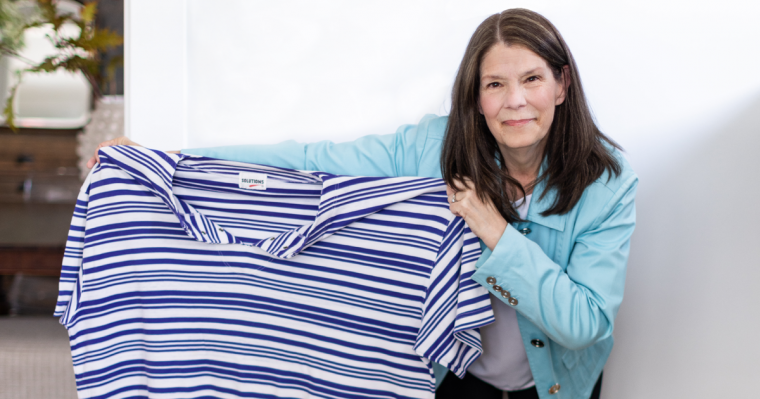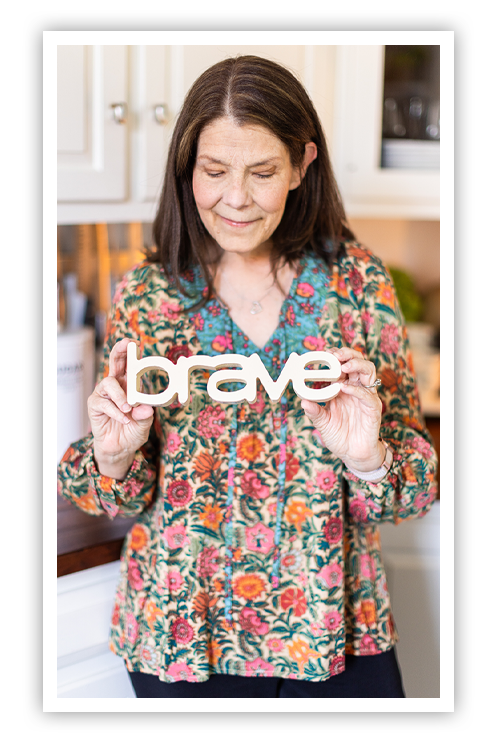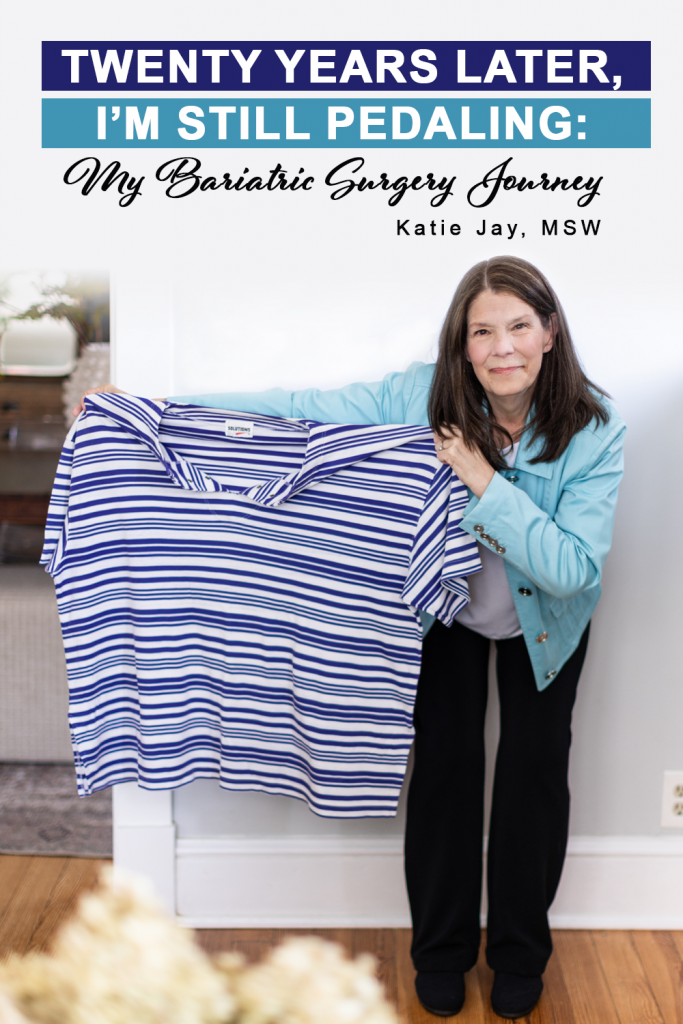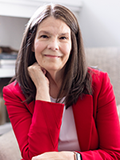
Twenty Years Later, I’m Still Pedaling: My Bariatric Surgery Journey
September 24, 2025Twenty Years Later, I’m Still Pedaling: At 331 pounds and gaining, I stood at the top of my short driveway, feeling completely defeated. I couldn’t even walk the 20 feet to my mailbox. My lower back hurt so badly the thought of going down the driveway—and then back up the stairs into my house—felt impossible.
So, I gave up and left the mail where it was, just like I’d been leaving other parts of my life undone. I lumbered back inside and ate a bowl of chocolate ice cream with Spanish peanuts—for breakfast.
By age 44, I had tried everything, beginning with an all-protein diet at 12. I went on to try Nutrisystem at 25 and 28, a 12-step program at 26 and 27, Weight Watchers at 30, my endocrinologist’s diabetic plan at 31, and even an inpatient binge-eating program at 41.
Like many of us, I lost and regained more than 100 pounds three times. I just couldn’t keep it off.
I hit bottom when I took my son to Disneyland with a friend, and she had to push me in a wheelchair the whole time. I felt embarrassed about needing to be pushed in a wheelchair, but I knew I couldn’t walk all over Disneyland. I couldn’t fit in many of the rides, either.
That Disney experience was a wake-up call for me, but I knew I couldn’t change. I’d tried and failed at nearly every weight-loss program known to man.
Finally, fortunately, my gallbladder gave out. I went to a surgeon, Dr. Oswaldo Anez (now retired), to discuss having it removed, but to my surprise, he firmly suggested I consider undergoing gastric bypass at the same time.
I remember thinking, “Am I really that bad?”
They wheeled me into the operating room on July 14, 2004. I remember feeling grief, fear, and overwhelmed, but also determination.
The Surgery Wasn’t Magic—My Recovery and New Lifestyle were Overwhelming at First
Before I had surgery, I imagined it would be the smooth road I’d been longing for. Instead, I found myself riding a bike on a bumpy, unpredictable path. When I didn’t look ahead, I’d hit a bump and get thrown into a nasty ditch.

But instead of giving up, I crawled my way out of the ditch, bloody and bruised, and got back on the bike.
- I learned to think through where I wanted to go and find the best way for me to get there.
- I looked ahead—to anticipate stress, holidays, hunger, relationship issues, grief, frustration, and other challenges.
- I used the brakes—to slow down, pause, check in with myself instead of pushing forward, and make sure I still was headed in the right direction.
- I got stronger so I could pedal even when I was tired—and I kept going, one determined push at a time.
- And, most importantly, I learned to get up when I fell—again, and again, and again.
What Helped Me Keep Going
While the years after surgery were not always easy, I was thrilled when I realized I could fit into a restaurant booth, cross my legs, and walk for miles and miles. I had the energy of a two-year-old.
I rediscovered a part of me I thought had been lost forever and experienced profound gratitude.
At the same time, I’ve faced complications, setbacks, and emotional lows over the years. I’ve survived a bowel blockage, breast cancer (with bilateral mastectomies and chemotherapy), rape trauma therapy, a brain injury, brain surgery, and the emotional eating so many of us turned to during COVID.
There were times when I became overwhelmed and regained weight (as much as 70 pounds after my brain injury). But over time, I stopped seeing those moments as failures. They were bumps—not the end of the road.
I just kept getting up every time I fell.
- What made the biggest difference was learning to: Listen to myself more deeply,
- Trust my own process, even when it didn’t look like anyone else’s, and
- Care for myself with kindness instead of unrelenting judgment.
I stopped trying to “fix” myself and started trying to understand myself. I stopped dieting and started nourishing my whole being. I came to see that there is not just one way to lose and maintain after bariatric surgery. We each make our own way—based on our unique combination of needs and challenges.
I’ve relied on a simple set of principles, but benefiting from them required me to keep an open mind and do the work. I learned to view myself with more compassion, and I experimented to find a way to meet my deeper needs.
Over the years, I’ve devoted myself to teaching a nonjudgmental, self-compassionate approach to women who’ve had bariatric surgery. What I’ve found—through both lived experience and the research I’ve conducted and published is this:
Real, lasting change doesn’t come from self-forcing or self-control. It comes from self-compassion and self-trust.
20 Years Later, I’m Still Pedaling
I’m proud to say I’m down 206 pounds from the goal weight my surgeon and I chose back in 2004. But more than that, I’ve grown into the kind of woman I never thought I could be:
- I practice self-awareness, self-compassion, and self-care.
- I’m honest with myself about what I need and want and take responsibility for my well-being.
- I ask for help and support.
- I treat myself with loving kindness.
- I set boundaries and let go of relationships that drain me.
- I enjoy the bariatric lifestyle I’ve discovered for myself through trial and error.
- I’ve stopped apologizing for my existence. Instead, I ask, how can I serve?
My journey hasn’t been a straight line, and I’m not “done.” I’m not cured. But I’ve become resilient. I know how to get back on the bike; I know the best path for me to follow; I set a realistic pace; and have committed to be in it for the long haul.
If You’re on a Bumpy Path Too…
Maybe you’re still at the bottom of the driveway, wondering how you’ll get back to the house, or you’ve taken a tumble and don’t know how to get up again.
Just know this: When we fall, it hurts, and we suffer. When that happens, we need to remind ourselves we are human—we are not the only person this is happening to. And we need to encourage ourselves kindly and without judgment to get back up as soon as we can.
You’re not alone. You don’t have to be perfect—just don’t give up.
Katie Jay, MSW, Certified Life & Wellness Coach, is an internationally recognized authority on weight loss surgery and is the founder of BariSupport.com.

 | ABOUT THE AUTHOR Katie Jay, MSW, Certified Life & Wellness Coach, is an internationally recognized authority on weight loss surgery and is the founder of BariSupport.com. She has been researching, coaching, teaching, and supporting bariatric patients for 20+ years. Katie holds a master’s in social work, is a certified life and wellness coach, and is a trained experiential workshop facilitator. She is the author of Small Bites: Daily Inspirations for Weight Loss Surgery Patients and the groundbreaking book Katie Jay’s Weight Loss Surgery Stages of Transformation. |



